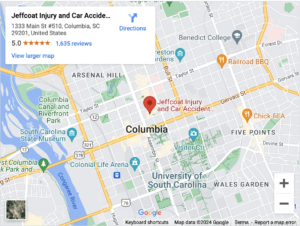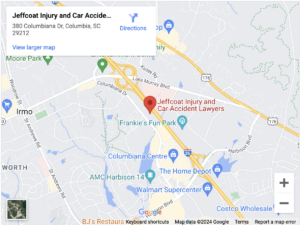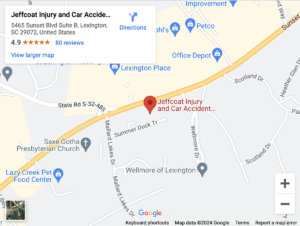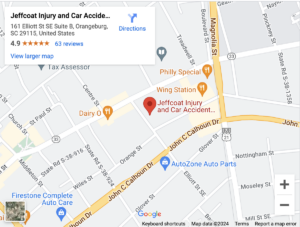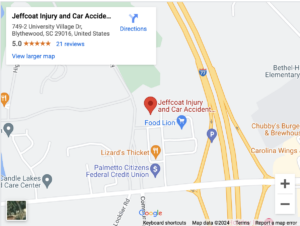July 25, 2025 | Columbia Personal Injury Blog \ Truck Accident Lawyer Near Me Columbia, SC \ Truck Accidents

Avoiding Costly Mistakes After a South Carolina Truck Accident
The aftermath of a truck accident can leave you physically injured, emotionally shaken, and financially vulnerable. When trucking company insurance adjusters start calling, what you say—or don’t say—can significantly impact your ability to recover fair compensation. These conversations might seem routine, but adjusters work for the insurance company, not for you. Their primary goal is to minimize payouts, which means your words could be used against you. Understanding what not to say to insurance adjusters is crucial for protecting your legal rights in South Carolina, where commercial vehicle accidents can result in devastating injuries and complex claims processes.
Don’t let the complexities of truck accident claims overwhelm you. At Jeffcoat Injury and Car Accident Lawyers, we’re here to help you navigate these challenging waters. Contact us at (803) 200-2000 or contact us today to ensure your rights are protected and your claim is handled with the utmost care.

Insurance Company Practices: What South Carolina Law Requires
Insurance companies operating in South Carolina are bound by specific regulations that govern their practices when handling truck accident claims. Under South Carolina insurance laws, these companies must process claims fairly and promptly. However, many adjusters employ tactics to distinguish between aggressive negotiation and improper conduct. Insurance Law Section 2601(a)(1) explicitly prohibits insurers from misrepresenting facts related to coverage, yet this violation occurs frequently. Claimants should know that insurance companies have been penalized for failing to make good-faith settlements even when liability was clear. Understanding these legal protections is your first defense when dealing with adjusters who may try to minimize your claim or delay processing. When speaking with adjusters, remember that their questions are designed to elicit responses that could limit your compensation. So, being informed about your rights is essential before engaging in these conversations.
The Critical First 30 Days: How Your Communications Shape Your Claim
The period immediately following a truck accident is particularly crucial for your claim. Insurance adjusters gather information, statements, and evidence to form their settlement strategy during this time. Being aware of this timeline can help you navigate these interactions strategically. When dealing with truck accident claims in South Carolina, insurance companies often use time as a tactical advantage, as delays in resolving claims can postpone crucial medical care and increase economic pressure on victims. Here’s what typically happens during these critical first weeks:
-
Initial contact occurs within 24-48 hours after the accident, when you may still be medically vulnerable and legally unprepared.
-
Recorded statements are typically requested within the first week, though insurance companies have been found in violation for misrepresenting policy provisions relating to coverage during these conversations.
-
Document requests continue throughout the first month, with adjusters often using vague language rather than properly referencing specific policy provisions as required by Department Regulation No. 64
-
Settlement offers frequently come around day 21-30, strategically timed when many victims face mounting medical bills and lost wages, creating financial pressure to accept low offers.
-
Insurance companies sometimes use fabricated reasons for claim denials or delays, making thorough documentation of all communications essential for challenging improper practices.
Protecting Your Truck Accident Claim with Strategic Communication
When facing communications with insurance adjusters, your approach can make the difference between receiving fair compensation and settling for far less than you deserve. At Jeffcoat Injury and Car Accident Lawyers, we’ve seen how properly managing these interactions helps preserve claim value. The key is balancing necessary cooperation with strategic protection of your interests. Never provide recorded statements without legal representation, as these can be edited or taken out of context. Limit discussions about fault or liability, since South Carolina’s comparative negligence laws mean any admission could reduce your compensation. Be highly cautious about discussing your injuries, as premature statements about your condition may be used to minimize long-term impacts. When dealing with trucking company insurers, remember they have teams of specialists working to reduce payouts, while you’re likely experiencing this process for the first time. This imbalance of experience makes having knowledgeable representation significant in commercial vehicle claims.
Dangerous Statements That Can Undermine Your Truck Accident Claim
Certain seemingly innocent statements can severely damage your chances of receiving fair compensation after a truck accident. Insurance adjusters are trained to listen for specific phrases that can later be used to justify lower settlements or claim denials. Understanding these potential pitfalls is essential for protecting your rights during these critical conversations. Many victims don’t realize that casual comments, apologies, or speculation about what happened can be documented and used strategically by the insurance company throughout the claims process. Even expressing uncertainty about details or making statements about your physical condition can create challenges for your case later.
Never Say “I’m Sorry” or Accept Any Blame
One of the most damaging statements you can make to an insurance adjuster is any form of apology or acceptance of blame. This is particularly true in South Carolina, where comparative negligence laws can reduce your compensation based on your percentage of fault. Even saying “I’m sorry this happened” can be interpreted as an admission of responsibility. Similarly, avoid statements like “I didn’t see the truck” or “I might have been going a little fast,” which suggest negligence. Insurance adjusters are trained to document these statements and may use them to shift liability away from their client. We’ve had cases where clients made casual apologies during initial conversations with adjusters, only to find those statements prominently featured in the insurance company’s denial letter weeks later.
Responding to Common Insurance Adjuster Tactics After a Truck Crash
Understanding insurance adjusters’ typical strategies can help you navigate these challenging conversations more effectively. Adjusters representing trucking companies often use techniques to minimize liability and reduce settlement amounts. They may fail to acknowledge communications about claims promptly, which is a violation of insurance regulations. Another common approach is offering quick settlements before fully understanding your injuries or damages. These early offers almost always undervalue your claim and may not account for ongoing medical needs or future complications. Some adjusters might also request broad medical authorizations that give them access to your entire medical history, looking for pre-existing conditions they can use to deny aspects of your claim.
When Adjusters Misrepresent Policy Coverage
A particularly concerning tactic is when adjusters misrepresent policy provisions relating to coverage. This practice violates Insurance Law Section 2601(a)(1), yet continues to occur. For example, an adjuster might claim certain damages aren’t covered when they are, or they might suggest policy limits are lower than they are. They may also fail to properly reference specific policy provisions when denying claims, which violates Department Regulation No. 64. When faced with coverage denials or limitations, always request the specific policy language in writing. This documentation can be crucial if you need to challenge improper denials later. Remember that insurance companies have been penalized for these practices, demonstrating that these aren’t isolated incidents but systematic approaches to reduce payouts.
The Special Challenges of Commercial Truck Accident Claims in South Carolina
Truck accident claims involve unique complexities, distinguishing them from typical auto accident cases. These challenges make proper communication with insurance adjusters even more critical. Commercial trucking accidents typically involve multiple liable parties, including the driver, trucking company, maintenance providers, and sometimes cargo loaders or manufacturers. You may deal with various insurance adjusters, each representing different interests. Additionally, trucking companies must carry much higher insurance limits than regular drivers, often in the millions of dollars, which means adjusters have even greater incentive to minimize payouts. They also have access to rapid response teams on the accident scene within hours, collecting and sometimes controlling crucial evidence.
Dealing with Delayed Settlement Tactics
One particularly troubling practice in truck accident claims is the deliberate delay of claim processing. Insurance companies know that delays in resolving claims can postpone crucial medical care for accident victims and increase economic pressure, often forcing desperate claimants to accept lower settlements. When adjusters say they’re “still investigating” or “waiting for more documentation” months into your claim, this may be a strategic delay tactic. Some adjusters even provide fabricated reasons for claim denials or delays. To counter these tactics, document every communication, follow up in writing, and be persistent about timeline expectations. Remember that insurance companies have been penalized for failing to attempt good faith settlements when liability was clear, giving you recourse if they unreasonably delay your claim. If you’re experiencing extended delays, this often signals that professional legal representation has become necessary.
Frequently Asked Questions
1. Should I provide a recorded statement to a truck company’s insurance adjuster in South Carolina?
Generally, you should avoid giving recorded statements to insurance adjusters without legal representation. These statements can be edited, taken out of context, or used to find inconsistencies that might undermine your claim. Insurance companies may misrepresent the necessity of these recordings, but you have the right to decline until you’ve consulted with a Columbia truck accident lawyer. If you must provide a statement, keep it factual, concise, and avoid speculation about fault or the extent of your injuries.
2. How long must I file a truck crash claim in Columbia, South Carolina?
In South Carolina, you generally have three years from the accident date to file a personal injury lawsuit for a truck accident. However, this doesn’t mean you should wait to begin the claims process. Insurance companies often use delays in processing to their advantage, and vital evidence can disappear quickly after commercial vehicle crashes. Starting the claim promptly while being careful about communications with adjusters is typically the best approach.
3. What if the trucking company’s insurance adjuster offers me a quick settlement?
Early settlement offers from trucking company insurers are almost always undervalued and designed to limit their liability before you fully understand the extent of your injuries. Many truck accident injuries develop complications over time, and accepting an early offer means you cannot seek additional compensation later, even if your condition worsens. These quick offers often fail to account for long-term medical needs, lost earning capacity, and non-economic damages like pain and suffering. It’s advisable to consult with a South Carolina truck accident law specialist before accepting any settlement.
4. Can insurance adjusters access my medical records after a Columbia commercial vehicle accident?
Insurance adjusters can only access your medical records if you provide authorization. Be cautious about signing broad medical releases, as adjusters often request access to your entire medical history to look for pre-existing conditions or unrelated issues they can use to deny aspects of your claim. Instead, consider only providing records directly related to your accident injuries. A Columbia commercial vehicle claims attorney can help you determine what medical information is relevant and necessary to share while protecting your privacy and claim value.
5. What if the truck accident adjuster pressures me to make decisions quickly?
Pressure tactics are a common strategy used by insurance adjusters to secure favorable outcomes for their companies. This is a red flag if you’re feeling rushed to make decisions. Insurance regulations require companies to give claimants a reasonable time to consider their options, and pressuring tactics may violate insurance regulations. Politely inform the adjuster that you need time to consider your options or consult with an SC semi-truck injury attorney. Document any instances of pressure or harassment, as these can demonstrate bad faith practices if your claim later requires legal intervention.
Work with a Truck Accidents Lawyer
Communication with insurance adjusters after a truck accident requires knowledge, strategy, and patience. While you focus on your physical recovery, an experienced truck accident attorney can handle these complex interactions on your behalf, ensuring your rights are protected throughout the claims process. Legal representation creates a buffer between you and insurance adjusters, preventing damaging statements and ensuring all communications support your claim rather than undermine it. Attorneys familiar with South Carolina truck accident cases understand the state’s specific regulations governing commercial vehicles and insurance practices. This allows them to identify violations like failure to acknowledge claims promptly or misrepresenting policy provisions. They can also accurately value your claim, accounting for all damages, including future medical needs, lost earning capacity, and non-economic impacts like pain and suffering. When choosing representation, look for attorneys with specific experience handling commercial vehicle claims rather than general practice lawyers, as truck accidents involve unique regulations, evidence, and industry standards that require skilled knowledge to navigate effectively.
Don’t let the complexities of truck accident claims leave you in a bind. At Jeffcoat Injury and Car Accident Lawyers, we’re ready to lend a hand and guide you through the process. Give us a ring at (803) 200-2000 or contact us today to ensure your rights are safeguarded and your claim is managed diligently.

